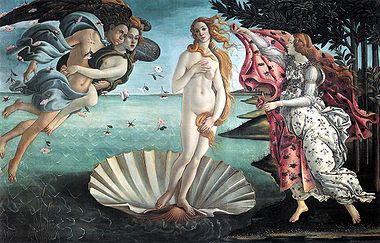Icon
noun
- 1 (also ikon)a devotional painting of Christ or another holy figure , typically executed on wood and used ceremonially in the Byzantine and other Eastern Churches.
- 2 a person or thing regarded as a representative symbol or as worthy of veneration:this iron-jawed icon of American manhood
- 3 Computinga symbol or graphic representation on a screen of a program, option, or window.
- 4 Linguisticsa sign which has a characteristic in common with the thing it signifies, for example the word snarl pronounced in a snarling way
--------------------------------------------------------------------------
Traditionally, the word icon is usually applied to imagery that has religious influences, photos of christ etc. Even the 10 commandments talks of 'icons' in that ''you shall have no other gods before me'' and talk of ''graven images''. The ideaology that nobody of christian nature of belief should in any way worship of follow the ruling of another deity or if we are following the traditional definition of the word 'icon'.
The word icon is taken from the mid 16th century in latin from greece.
Many people are familliar with the famous greek art, the iconic statues and paintings that often show the many god's and godesses they worshipped.
Its note worthy that the greek often showed such religious beings in their statues and paintings, relating back to the traditionally definition of icon.
Sandro Botticelli's - the birth of venus
Of course in todays society, the words icon and iconic can vary vastly in meaning from the traditional showing of christ and other such deities.
In the modern world people seem to associate iconography with an image they have seen often, something that has grabbed the attention of the media and gained large amounts of notability from the general public; things such as 9/11, the Kennedy assassination and Martin Luther King's 'i have a dream' speech.
The definition of icon has become so blurred from its traditional meaning in modern times that not only is it applied to moments in history but whole periods such as WW1 & WW2, the renaissance and the black plauge. All iconic periods in time there in no doubt, but are they really deserving of being compared to the likes of Madonna, Micheal Jackson, Clint Eastwood and Brad Pitt?
Is it fair to say that the media has blunted the pencil of iconography down to the point that celebrities are considered as icons alongside Christ, natural and unatural disasters?
It seems to me, that iconography is no longer just a place for god or for history, but a point individual to the one who chooses the icon. While many such as Madonna and Micheal Jackson may well be considered icons of the modern world by the general public each of us will have our own icons and falling under this title shared by religious deities and 9/11, yet these may well be minor celebrities or film stars. However it may also include family, friends and something altogether more wholesome.
- Nicolle




No comments:
Post a Comment